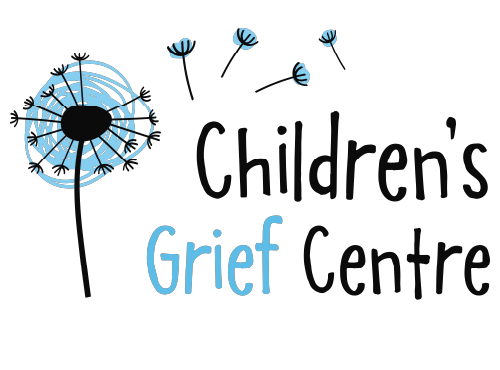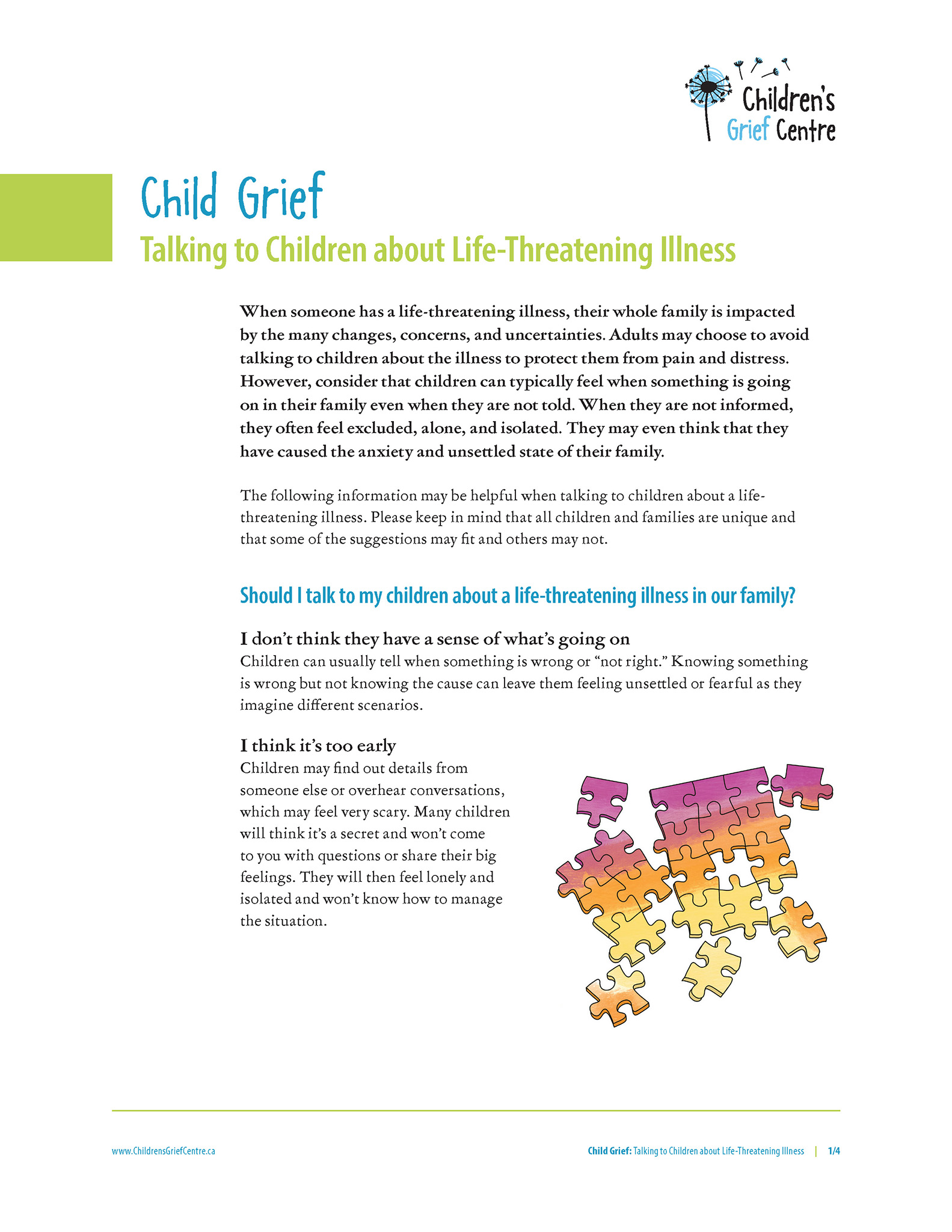Child Grief
Talking to Children about Life-Threatening Illness
When someone has a life-threatening illness, their whole family is impacted by the many changes, concerns, and uncertainties. Adults may choose to avoid talking to children about the illness to protect them from pain and distress. However, consider that children can typically feel when something is going on in their family even when they are not told. When they are not informed, they often feel excluded, alone, and isolated. They may even think that they have caused the anxiety and unsettled state of their family.
The following information may be helpful when talking to children about a life-threatening illness. Please keep in mind that all children and families are unique and that some of the suggestions may fit and others may not.
Should I talk to my children about a life-threatening illness in our family?
I don’t think they have a sense of what’s going on
Children can usually tell when something is wrong or “not right.” Knowing something is wrong but not knowing the cause can leave them feeling unsettled or fearful as they imagine different scenarios.
I think it’s too early
Children may find out details from someone else or overhear conversations, which may feel very scary. Many children will think it’s a secret and won’t come to you with questions or share their big feelings. They will then feel lonely and isolated and won’t know how to manage the situation.

I’m not ready
Sharing difficult information with our children is hard. It breaks our hearts. Take time to think about what you want to say but know that it’s okay if you don’t say it perfectly. You may want to have a family member or good friend join you to help you with the conversation.
My children will never be the same
This illness will change your children. It’s unavoidable. Events in our lives change us. Talking with and involving children may offer your family an opportunity to become closer. Create stronger bonds, share openly, and have special times together that will become cherished memories to hold tight to their hearts. This difficult time in your family creates an opportunity for exploring and sharing emotions, effective coping strategies, and supports.
Where to begin?
Consider WHAT information to share
- Start small with limited information and present it in simple terms. Adapt the language and words to suit ages and levels of understanding.
- Start with being curious about what they may know, have asked, or noticed and build from there. “You asked me before why I wasn’t eating my dinner and why I wasn’t able to run with you, and I told you that I didn’t have much appetite and energy. Well, the reason for that is….”
- Consider explaining what’s going on in stages or different conversations. This will allow you to have a sense of their questions which will guide what and how much you share.
Consider HOW you will have conversations
- Choose a private time and space so you can feel comfortable with whatever emotions come up, and they do too. Limit interruptions so that everyone is fully present for this conversation.
- For young children, the best time might be when you’re doing a craft or playing a game together. For older children, it might be when you have quiet time together and can put down your books or pause a movie. You may also find that you have the best conversation with your child in the car or on a walk. You know what will work best for your family.
Consider WHEN might be best
- Avoid bedtime for these conversations. It might seem like a good time because it’s quieter, and you have your child’s full attention. However, it is also that time when children are alone and in the dark. They may struggle to sleep and need your presence.
- Consider an earlier time in the day when you are not rushing to go to school, work, hockey, swimming, or piano practice. This will allow for follow-up conversations but primarily allow for time for comfort, presence, and reassurance.
Consider WHO is included

- Your goal is to face challenging times together, and it’s important to include the whole family in conversations, including the person who is ill. Depending on who is sick and the children’s age, you may have one, two, or more talks before the person who has a life-threatening illness joins the conversation.
- A combination of joint conversations and individual conversations is best. You want to avoid secrets and encourage family members to find support in one another.
- Children often try to protect their parents from their biggest fears and feelings. It’s important that you give them permission to share. You can also identify other people they can talk to. Those people can be family members, good family friends, teachers, or counsellors.
What else?
Share some of the practical impacts of the illness on them and the family
- Talk about changes to routines, including family members and friends helping with tasks like dinners, cutting the grass, or driving them to soccer practice. Tell them about appointments at the hospital or home visits from nurses and other health care professionals.
- Reassure them that you will do your best to maintain routines and invite them to share when something doesn’t feel right for them or if they wish to do something a certain way.
- Maintain boundaries and discipline as much as possible. While it may feel hard to stick to rules and set limits when they’re going through so much, it’s actually kind to them. Boundaries help children feel safe and cared for. When life may seem out of control and like a roller coaster, routines and boundaries provide a sense of knowing and control in their lives.
“I don’t know” and “I’m not sure” are perfectly valid answers to your children’s questions
- Your goal is to create open and honest dialogue. Sometimes, we don’t have the answers, or we’re not ready to talk about something. A kind and warm “that’s a great question. I’m not sure I have an answer right now. Can I get back to you?” acknowledges the importance of the question and validates the child for seeking answers. It also gives them permission to think about things and seek answers.
Whether you see it or not, your children take in the information, and the illness does impact them.
- Some children will cry or be clingy and refuse to go to school as they develop some fear and anxiety of leaving the person who is ill or other people they care about. Others may seem unaffected. It’s important not to confuse your child’s way of processing the information and its impact with not taking in the information or not caring.
- We all deal with things differently. Create opportunities to spend time together and allow them their space. Be gently curious: “I wish I could read your mind. Is there anything you want to share with me? Are there questions I can try to answer?”
- Share, in limited details, how you cope with big feelings. Sharing that you talk to friends, go for walks, scream in a pillow, or something else models for your children that it’s okay to reach out and important to deal with our feelings.
There is always room for connection, care, and comfort
- Whether it’s a special meal, a fun day out, or simply watching a favourite show or movie together, that investment of presence and time goes a long way to make children and family members feel connected. It can help create the sense that you are all in this together.

To view childrens book to help support discussions about advanced illness, go to our Resources for Adults & Families Living with Advanced Illness page.
For more information, a consultation, or to seek support for your child, teen, and family, contact us at 403-263-4525 or info@childrensgriefcentre.ca.




